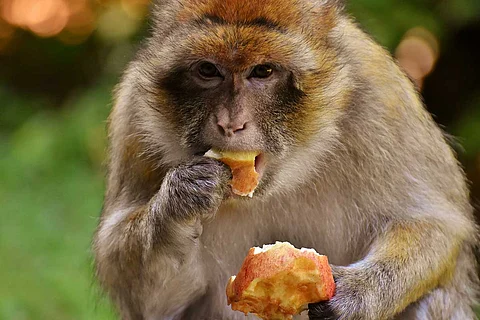

Ever since the lockdown commenced, there have been reports of good Samaritans feeding monkeys in towns and roads located near forest areas. However, scientists have advised against this, calling for strict action against people who feed monkeys during the lockdown.
"One of the major issues is that there is a chance of the monkeys getting infected from humans amid the coronavirus. It can lead to a major environmental hazard, and other wild animals may also get easily infected from the monkeys,” PS Easa, former director of the Kerala Forest Research Institute, told TNM.
Easa points out that many of these animals have lost their natural wilderness and largely depend on humans for survival, and this often leads to man-animal conflict.
"Feeding them is a major reason for the menace. They now depend largely on humans for their food and thus they expect it all the time. Among man-animal conflict, monkey menace is quite common in many places," he said.
He also added that if humans continue to feed them, they might lose their natural food-finding talents.
PO Nameer, Professor Department of Wildlife Science, Kerala Agriculture University, said that monkeys are very intelligent and they easily associate humans with food"Since we feed them, they find food naturally and largely depend on people. They also develop violent behaviour to get food. We have also noticed in some areas that these monkeys attack women and children selectively," Nameer pointed out.
"We might feed them out of sympathy. But that doesn't help them," he added.
There are international studies that monkeys fed by humans are susceptible to various health issues. A study by the University of Lincoln in 2016 showed that the monkeys fed by tourists developed a poor quality of fur, had some patches of alopecia, and a higher level of stress hormone. The study also said that reproduction among such monkeys was comparatively very low.
There are reports on how monkeys in Ayodhya attack humans after their supply of food that they used to get from tourists was stopped amid the lockdown.
‘Lockdown a perfect time to correct nature’
PO Nameer observes that lockdown will be a perfect time to correct this adaptation of monkeys.
“Lockdown is the perfect time since people no longer go to tourist spots and the monkeys there who are largely dependent on humans for their food can now go back to their nature of looking for food themselves. People who feed them have to stop this to revoke a natural process," he said.
Asserting a similar opinion, PS Easa also said strict awareness should be given to the public and whoever feed them.
"Majorly, people feed them because of unawareness. Strict action should be taken against this," he said, adding that there are reports from Wayanad and Athirapally that monkeys who were waiting for tourists on the road sides are no longer being spotted.
"Forest officials were telling that those monkeys have gone from the roads back into the forest. This healing process should take place," he added.
The experts have condemned incidents where forest officials were found feeding monkeys.
"That is a totally condemning act. Forest officials have to check these wrong practices. If they themselves do this, what can be done," Nameer added.
In Kerala, there is a strict order from the Forest department not to feed the monkeys. Many such attempts recently have been blocked by them.
According to the Wildlife (Protection) Act, 1972, feeding wild animals is a crime.
Experts also point out that a poor waste management system leads to these animals largely depending on waste dumped by humans to feed themselves.
"It is similar in the case of stray dogs and monkeys. They largely stick around in public places as they can feed on these waste dumped on roadsides. This is a system that needs to be corrected," Nameer said.
Easa also points out that after lockdown, all the self-government local bodies must ensure proper waste management to avoid monkeys coming back to the roads and streets to look for food. "This is the time they can go back to their natural living and even after this we should ensure that they are not fed, and that waste is not dumped unscientifically," he added.